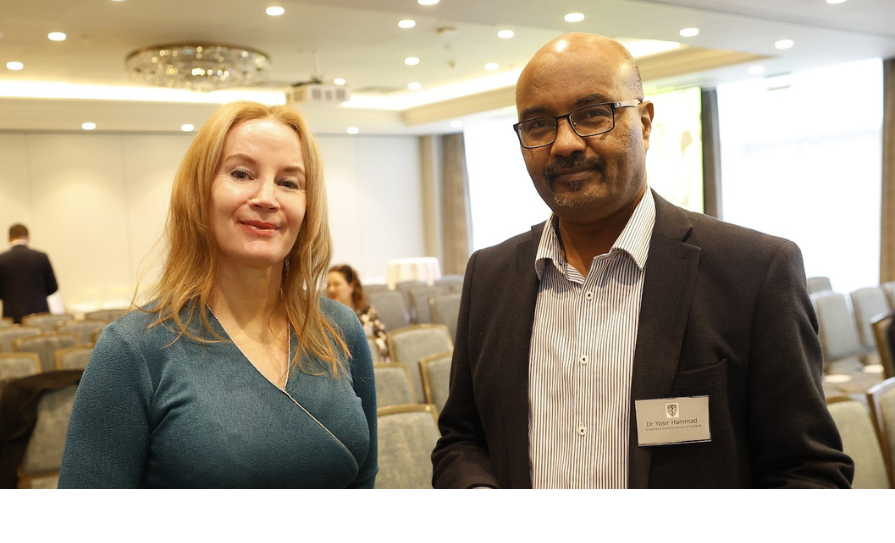The President of the Sudanese Doctors Union of Ireland (SDUI) has expressed disappointment in the HSE, Medical Council, and healthcare system for failing to support Sudanese doctors’ wellbeing amid the devastating war in Sudan, which erupted in April.
Speaking during a Q&A section at the launch of the Medical Council’s new ethical guide, Dr Yassir Hamad said it was time for healthcare organisations – “especially the HSE” – to respond to the needs of the Sudanese doctors, who have been highly impacted by the conflict. Currently, there are over 1,600 doctors from Sudan registered with the Irish Medical Council.
Six months of war has plunged Sudan into “one of the worst humanitarian nightmares in recent history”, according to the UN.
As of last month, up to 9,000 people have been reportedly killed and more than 5.6 million driven from their homes. Some 25 million people are in need of aid arising from the conflict between the Sudanese Armed Forces and the paramilitary group Rapid Support Forces and other armed groups. “For six months, civilians – particularly in Khartoum, Darfur and Kordofan – have known no respite from bloodshed and terror,” stated the UN.
Dr Hamad, who is a Consultant Orthopaedic Surgeon, said Sudanese doctors in Ireland are working diligently in a pressurised system while dealing with the stress and grief of losing family members, homes being destroyed, and internal and external displacement of family members, who they are supporting financially and emotionally.
He said members of the SDUI are “really disappointed” that “no-one approached us” to offer support apart from the Medical Council. He recounted a comment by a Sudanese doctor that “the whole response over the last six months was a half-day off by his boss”. Dr Hamad was speaking directly after a session on doctor wellbeing held at the Council’s event in Dublin yesterday.
Dr Hamad, who is based at Connolly Hospital, Blanchardstown, thanked Council President Dr Suzanne Crowe for a video message of support she prepared for a meeting of the SDUI on 28 October. The Council President also issued a letter of support after the eruption of the conflict earlier this year, in which she indicated the Council would advocate on behalf of Irish-based doctors trapped in Sudan at the time.
“We have been working in Ireland from consultant level to junior level, covering on-calls relentlessly, and we never ask for anything – but it is the right time to talk to the audience and representatives of the HSE, representatives of the Medical Council, and any healthcare services, that our members have been really disappointed,” outlined Dr Hamad. “Apart from the Medical Council no-one approached us…We feel as Sudanese doctors in Ireland for the last six months being drained emotionally and financially. Our members…thank [Dr] Suzanne [Crowe] for her speech but I think there is a lot to be done.”
Dr Hamad’s comments were met with applause at the event, with Dr Crowe acknowledging his remarks and referencing the importance of a “shared humanity”.
Speaking afterwards to the Medical Independent (MI), Dr Hamad urged the HSE, Council and other relevant organisations to provide support for the wellbeing of the doctors. He said many Irish hospitals had approximately 40 Sudanese doctors among their staff.
“Each one of us has been affected by the war directly or indirectly,” he said.
These impacts have included the loss of family members, loss of homes, family members trapped in the country, and family members displaced internally and externally.
“[The doctors] have to really support them in all different ways, we are emotionally and financially drained, and in spite of that, we have been working all the past six months under very stressful conditions and none of the HSE officials have approached us or gave us support, that our members needed,” he told MI.
There have been many measures Sudanese doctors have taken to try to support their families in and outside Sudan. It has been a “very stressful time for us and it is still continuing”, advised Dr Hamad, “and we just need more support for our members on the wellbeing side”.
Asked what type of supports would be welcomed, Dr Hamad responded that for some members this would be an offer of additional leave to assist their family members, many of whom had no other supports or sources of income.
Dr Hamad also said the assistance of occupational health was required for some of the doctors. He advised that information on supports should be actively circulated to Sudanese doctors as they may be reluctant to come forward.
Many of the community are “a bit shy” and some are “even afraid to stop working [to take leave] because if they lose their job, they wouldn’t have any financial capability to support people being displaced and trapped.”
He said the Medical Council should further examine ways it can assist doctors, such as in regard to registration fees, and it could “open the door for the wellbeing section … to be approached by our members”.
A HSE spokesperson commented: “The HSE Employee Assistance Programme (EAP) is a free confidential support service that provides specific wellbeing supports and interventions for staff and service managers.”
The EAP service “continues to run awareness messaging” to highlight and signpost EAP as a key service available for all HSE health and social care staff, to help “promote and normalise the seeking of support”.
The 24/7 national EAP phone-line is 0818 327 327.
Information on the Employee Assistance Programme is available at https://healthservice.hse.ie/staff/benefits-services/benefits/counselling.html
The SDUI is a non-profit, non-political voluntary organisation established in 2010 as the representative body of the entire community of expatriate Sudanese doctors working in the Republic of Ireland. Further information can be found here: https://www.sdui.ie













Leave a Reply
You must be logged in to post a comment.